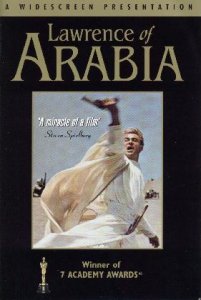Since 1962 when Lawrence of Arabia was released to huge critical acclaim winning seven Academy Awards, including Best Original Score for Maurice Jarre, Best Picture and Best Director for David Lean, its 220 or so minute length had continuously diminished due to theatre and television timing constraints. (Cinephotographer, Freddie Young also received an Academy Award; and Peter O’Toole, Omar Sharif and screenwriter Robert Bolt were all Oscar nominated.) Now this marvellous heroic epic, probably one of the finest films ever made has been painstakingly pieced together again, back to its full length, and refurbished so that in its first-timeDVD format it positively glows – colour is well nigh perfect and pictures clear and crisp. The desert scenes are truly magnificent.
The story is too well known for me to detail it here except to say that it is the true life story of T.E. Lawrence who united hostile Arab factions and led them to victory against the Turks in World War I, culminating in the retaking of Damascus.
The film comes with a vast array of features including an impressive ‘a-making-of’ documentary – impressive that is except for the vital coverage of the music. Disappointingly, Jarre is not interviewed; it would have been fascinating to have his impressions about his influences and how he set about scoring the film. We learn that both Sir William Walton and Sir Malcom Arnold had been approached first. We also discover that Marlon Brando and Albert Finney had been interested in appearing as Lawrence, with Finney impressing in his tests, before O’Toole was finally contracted. The features also include the original theatrical trailer, an interview with Steven Spielberg about the restoration process which included the need for O’Toole and some of his fellow actors to over-dub some of the lines afresh. There are also maps, texts and photos of the desert campaigns, filmographies of the cast and crew and footage of the New York premiere. Disc 2 has a DVD ROM element with archives of Arabia.
One of the very best DVD releases even though it would have been better for film music fans to have had more attention spotlighted on Maurice Jarre’s contribution.
Ian Lace





